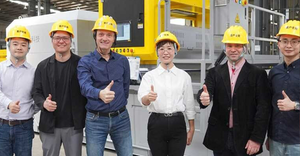September 1, 2005
Ed Repa
THE WASTE INDUSTRY, LIKE other industries, significantly benefits from new technology. Just take a look at our history. After centuries of traditional operating methods, solid waste management began evolving in the 1970s with the rise of environmental awareness. The industry rapidly changed in the 1980s, spurred by public concerns over the “throwaway society” and the decreasing number of local municipal solid waste (MSW) landfills. New laws and regulations set higher environmental standards for disposal facilities and encouraged alternatives to disposal.
Despite these changes, research by the waste industry was so small as to be immeasurable. Funding from other sources also was limited, and federal research dollars often served more to identify or quantify suspected regulatory problems than support applied research.
The information gaps became increasingly apparent as waste management became more complex. Few formal studies were available to guide decision-makers about recycling and disposal technologies. A clear path did not exist for bringing new technology from the laboratory to the workplace. Little concrete guidance could be found on managing the fluctuating recycling markets. Even statistics on the size and scope of the industry were limited.
In 1992, the Environmental Research and Education Foundation (EREF) was established to fill the gap in solid waste industry research. Since its founding, EREF has developed new approaches to managing wastes and research practices that improve safety, health and the environment in the solid waste industry.
EREF has provided educational grants for public information projects about the solid waste management industry and has created professional training and educational materials. Following are some of the foundation's activities:
Development of SWANA's “Bioreactor Landfill Operator Training Course;”
University support, including sponsorship of North Carolina State University's International Landfill Research Symposium and development of the educational program “Solid Choices” with the University of South Florida;
Development of the video “Bury, Burn or Return: Winning the War Against Waste” that aired on PBS and was distributed to 3,200 middle schools with an accompanying manual; and
Development of EIA's ethics program “Doing Our Best — A Matter of Integrity.”
EREF also has supported safety projects by helping companies reduce lost employee time, property damage, physical liability costs, equipment repair costs and equipment downtime. Projects have included:
Training sessions and videos about reducing employees' injuries and fatalities; and
Updating the EIA's Waste Equipment Technology Association's Manual of Recommended Safety Practices for haulers, landfill employees and MRF employees.
In addition, EREF has supported projects that advance state-of-the-art waste management practices, including:
Bioreactor projects such as design and operation, testing granular blankets for leachate recirculation and reviewing literature about bioreactor landfills to identify research needs;
Development of a decision support tool with EPA that examines the environmental effects of MSW management decisions;
Development of an electronic nose for sensing landfill odors;
Characterization of MSW landfill microbiology using landfill gas; and
Development of technical and regulatory guidance for alternative landfill technologies.
EREF also has supported data-collecting projects to assess market conditions or support technical databases used by industry or federal and state regulators. Projects have included:
Collecting and testing of MSW landfill gas pre- and post-combustion in conjunction with EPA;
Assessing the regulatory, economic and technical aspects of greenhouse gas emissions;
Developing a global assessment of recycling polices and markets; and
Developing an economic model for recyclables.
For more information on EREF and its projects, visit www.erefdn.org.
Ed Repa is the director of environmental programs for NSWMA and the vice president of environmental programs at EREF. Email him at [email protected].
You May Also Like


